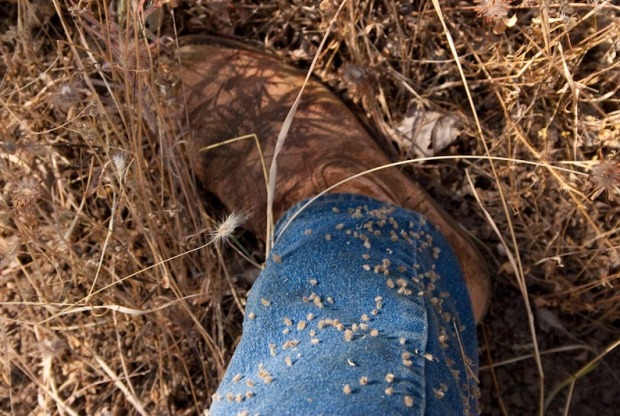The story of California native gardens is the story of weeds
Another post on weeds…
Judith Larner Lowry in ‘Gardening with a Wild Heart’ says “Somewhere in all this activity (of discovering CA native gardening), the gardener notices that most of the work involved is weeding. The story of gardening in California, and indeed the whole world, is the story of weeds.”
Do not let weeds go to seed…. One year of seeds brings seven years of weeds!
- Much of the pleasure of gardening depends on having the right tool for the job.
- Cut the weeds off at the soil surface thereby eliminating the weed’s ability to feed its roots.
- Cut weeds off with this tool you can simply leave them on the soil surface to dry and decompose over the course of a week or two
- Cultivate just deeply enough to cut the weeds off below the soil surface. Do not over cultivate.
- Less soil is disturbed, which brings fewer new weeds to the surface
The indignity of it!-
With everything blooming above me,
Lilies, pale-pink cyclamen, roses,
Whole fields lovely and inviolate,-
Me down in the fetor of weeds,
Crawling on all fours,
Alive, in a slippery grave.”
– Theodore Roethke, Weed Puller, 1948
Every way I know to control weeds
Hand pull
This is the actual pulling of weeds by hand. Simple. Primitive. Zen.
Sweeping
In the Southern US, garden paths are sometimes swept clean of leaves and loose dirt. This keeps weeds from sprouting. I have tried this and it works well.
Cultivating
Scratching the surface to kill weeds with tools, hoes cut off roots at surface. Hoe weeds before they go to seed! This tip was given me at a garden workshop at Roger’s Gardens.
Hoeing
Clear an area, water it and let the weeds sprout. Hoe them away and repeat. Takes a long time, if you have it.
Organic Mulch
Lay down a thick layer of mulch without weed seeds in it such as straw. Mulch can be put around plants a few inches away from the stems
Plastic mulch
Lay down plastic and plant in cut out holes. Some problems are that plastic breaks down quickly, looks messy and blocks water. I have seen a lot of ugly plastic.
Plant a cover crop
Plant a cover crop that outgrows the weeds. Unless it’s a native seed, I would never do this for fear of runaway weeds in unintended areas. Sounds expensive??
Weed whacking
Weed string trimmers do the job along driveways, fence lines and edges. We use it to trim dry brush and grass low enough for fire safety. Do this before the weeds go to seed. (See first quote, above)
Flame weeding
Uses a propane torch to kill the weeds. We have a flamer, but I have never used it, Has anyone had a good experience with this? My mother would pour boiling water over weeds in concrete cracks.
Spraying with glysophate*
Broad-spectrum systemic herbicide
Use carefully in certain cases. I use this,…carefully, on our mile of paths.
Drip irrigation
For areas with long dry seasons bury your drip tape and irrigate only where needed. Death by drought.
Use animals
Deer are decorative and weed out non-natives like roses.
Sheep will eat everything they can reach.
Goats will eat everything they can reach including Poison oak.
Make a salad (Thanks to Brent of Breathing Treatment )
Purslane,
Dandelions,
Lamb’s quarters, all edible and (probably) nice with a homemade vinaigrette.
If you have a weed that you don’t see here would you make a comment about it and I will add it to this gallery? Thanks! Also share if any of these methods work for you. Everyone has a strategy, even if it is to look the other way. I once built a low fence around my veggie garden, so I wouldn’t have to see the weeds from my kitchen window. Worked!
Weed identification Sources
Oregon State University
North Willamette Research & Extension Center Main Weed page
Oregon SU Weed Identification Guide Lots of photos, easy to ID weeds.
University of California-Davis Main Integrated Pest Management page
UC Davis Identification: Weed Photo Gallery includes many, but not all, weed species commonly found in California farms and landscapes.
UC Davis Weed identification tool—a technical key to identifying weeds, from the UC Weed Research and Information Center.
*We also use glysophate responsibly on poison oak. Some don’t agree with this, but we have 7 acres to keep safe for small people and dogs…just can’t have it and the systemic action means it gets killed through the roots so we know it’s gone for good.
Recent Posts
How to Be a Lazy Gardener
...and still have a pretty garden With a busy household and jobs, we are…
Summer is Spring at Whiskey Falls!
Take a day trip to Whiskey Falls... Come visit Whiskey Falls and the surrounding high…
California oak acorns: Feast or famine
Why do oaks drop more acorns some years and not others? If you have live…
Mule’s ear and Farewell to Spring
Roadside treasures worth stopping for In the first week of July in the Sierra foothills…
Our favorite butterfly plants
Wow! Butterflies love these plants! Grow any of these for instant results and each is…
A water-saving veggie garden for the foothills
Your water-wise veggie garden Does everyone in our Mountain Community grow at least one tomato?…

